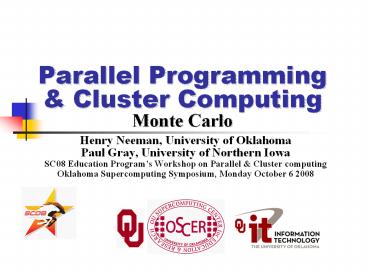Parallel Programming - PowerPoint PPT Presentation
Title:
Parallel Programming
Description:
Suppose you have some physical phenomenon. ... We want to know, say, the average properties of this phenomenon. ... of a phenomenon, and then take the average ... – PowerPoint PPT presentation
Number of Views:16
Avg rating:3.0/5.0
Title: Parallel Programming
1
Parallel Programming Cluster ComputingMonte
Carlo
- Henry Neeman, University of Oklahoma
- Paul Gray, University of Northern Iowa
- SC08 Education Programs Workshop on Parallel
Cluster computing - Oklahoma Supercomputing Symposium, Monday October
6 2008
2
Embarrassingly Parallel
- An application is known as embarrassingly
parallel if its parallel implementation - can straightforwardly be broken up into roughly
equal amounts of work per processor, AND - has minimal parallel overhead (e.g.,
communication among processors). - We love embarrassingly parallel applications,
because they get near-perfect parallel speedup,
sometimes with modest programming effort. - Embarrassingly parallel applications are also
known as loosely coupled.
3
Monte Carlo Methods
- Monte Carlo is a European city where people
gamble that is, they play games of chance, which
involve randomness. - Monte Carlo methods are ways of simulating (or
otherwise calculating) physical phenomena based
on randomness. - Monte Carlo simulations typically are
embarrassingly parallel.
4
Monte Carlo Methods Example
- Suppose you have some physical phenomenon. For
example, consider High Energy Physics, in which
we bang tiny particles together at incredibly
high speeds. - BANG!
- We want to know, say, the average properties of
this phenomenon. - There are infinitely many ways that two particles
can be banged together. - So, we cant possibly simulate all of them.
5
Monte Carlo Methods Example
- Suppose you have some physical phenomenon. For
example, consider High Energy Physics, in which
we bang tiny particles together at incredibly
high speeds. - BANG!
- There are infinitely many ways that two particles
can be banged together. - So, we cant possibly simulate all of them.
- Instead, we can randomly choose a finite subset
of these infinitely many ways and simulate only
the subset.
6
Monte Carlo Methods Example
- Suppose you have some physical phenomenon. For
example, consider High Energy Physics, in which
we bang tiny particles together at incredibly
high speeds. - BANG!
- There are infinitely many ways that two particles
can be banged together. - We randomly choose a finite subset of these
infinitely many ways and simulate only the
subset. - The average of this subset will be close to the
actual average.
7
Monte Carlo Methods
- In a Monte Carlo method, you randomly generate a
large number of example cases (realizations) of a
phenomenon, and then take the average of the
properties of these realizations. - When the realizations average converges (i.e.,
doesnt change substantially if new realizations
are generated), then the Monte Carlo simulation
stops.
8
MC Embarrassingly Parallel
- Monte Carlo simulations are embarrassingly
parallel, because each realization is completely
independent of all of the other realizations. - That is, if youre going to run a million
realizations, then - you can straightforwardly break up into roughly
1M / Np chunks of realizations, one chunk for
each of the Np processors, AND - the only parallel overhead (e.g., communication)
comes from tracking the average properties, which
doesnt have to happen very often.
9
Serial Monte Carlo
- Suppose you have an existing serial Monte Carlo
simulation - PROGRAM monte_carlo
- CALL read_input()
- DO realization 1, number_of_realizations
- CALL generate_random_realization()
- CALL calculate_properties()
- END DO
- CALL calculate_average()
- END PROGRAM monte_carlo
- How would you parallelize this?
10
Parallel Monte Carlo
- PROGRAM monte_carlo
- MPI startup
- IF (my_rank server_rank) THEN
- CALL read_input()
- END IF
- CALL MPI_Bcast()
- DO realization 1, number_of_realizations
- CALL generate_random_realization()
- CALL calculate_realization_properties()
- CALL calculate_local_running_average(...)
- END DO
- IF (my_rank server_rank) THEN
- collect properties
- ELSE
- send properties
- END IF
- CALL calculate_global_average_from_local_average
s() - CALL output_overall_average(...)
- MPI shutdown
11
To Learn More
- http//www.oscer.ou.edu/
12
Thanks for your attention!Questions?






























